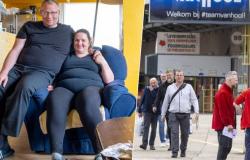
Relax in an eco-house from Slow Cabins, in the middle of the beautiful nature of the Pajottenland, the Noorderkempen or the Flemish Ardennes. Thousands of Flemish people did it, hundreds of private individuals invested in it… but now it’s time for books. The founder, the Antwerp entrepreneur Xavier Leclair, confirms that bookings are no longer being accepted in our country. He points to “a lack of legal framework” as the culprit.
“Hi, we regret to inform you that we are no longer accepting bookings in Flanders until further notice. Behind the scenes we are currently looking for solutions to guarantee the future of the Slow Cabins concept in Flanders.” Anyone who surfs to the Slow Cabins website to reserve a weekend or midweek in the middle of nature will return from a bare-bones journey: the NV Cabin Company, the Belgian company behind the ‘slow travel’ concept, was announced on March 12 by declared bankrupt by the court of Antwerp.
Money shortage and permit problems
“Until there is more clarity about the future, and to ensure maximum protection for future guests, we are currently no longer accepting bookings in Flanders,” says Antwerp ‘impact entrepreneur’ Xavier Leclair, founder and CEO of Slow Cabins. In recent years, it has rented out about 20 self-sufficient eco houses on underused or fallow agricultural plots in full nature, which provided the farmer with an extra income. “The activities in Ireland and the Netherlands have not been affected and are continuing without notice.”
Over the past year and a half, Leclair’s company has been looking for fresh capital to grow and meet its short- and long-term financial obligations. “Unfortunately, we have not been able to do this in the current challenging market conditions with rising interest rates.” According to business newspaper The time the company, which had an annual turnover of approximately one million euros, had accumulated a net loss of 650,000 euros over the years.
The founder attributes the failure to success to “continuing legal uncertainty about obtaining permits”. Last summer, the Council for Permit Disputes drew a line over four houses in Sint-Truiden after a complaint from the Environment Department and the Agriculture Department. Both Flemish government services feared cluttering the landscape and pressure on open space and agriculture. “For years we have argued for a clear legal framework that reconciles nature, agriculture and rural tourism, but in vain. That has deterred lenders and damaged our short-term chances of survival in Flanders.”
Hundreds of victims
“However, Slow Cabins caught on,” says Leclair. “Tens of thousands of Flemish people looking for some relief in these increasingly busy times tasted the concept, with a peak during the corona pandemic.” And private investors also saw value in it: “By mid-2021, we raised more than half a million euros in win-win loans, including through Winwinner.” This even broke the daily record on that Ghent crowdlending platform. Another capital round followed in the summer of 2022, again partly through Winwinner.
“Bankruptcy is also a painful thing for those early investors,” Leclair admits. He speaks of about 260 crowd investors who invested more than one million in Slow Cabins. They are now in danger of being left empty-handed. Although the entrepreneur continues to believe in his brainchild: “Behind the scenes, we work with the curator to find solutions in the interests of our guests, the company and its creditors.” To be continued (maybe)…
READ ALSO.Weekend houses and green cuttings suddenly very popular again: “72 hours in nature reduces stress levels by 70%”





